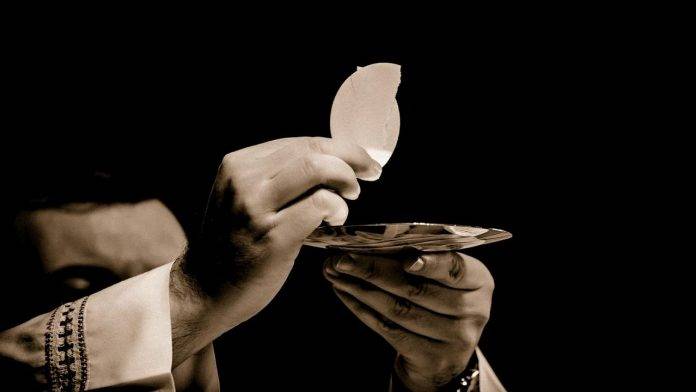Singleness for the Kingdom is not for disaffected and irresponsible peoplefor soured bachelors, but for truly in love and mature people. One of the worst evils that can happen to presbyters is affective anesthesia which reduces us to bureaucrats who want to make a career, to officials of the sacred. This is demonstrated by the figure of Sant’Agnese. Despite her young age and frailty she is presented, as vergine betrothed to Christ”more beautiful than the sun and the moon”, who with his ring has pawned her and placed the crown of glory on her head and whom she loved without measure and whose glorious Face she now contemplates after having sought it so much.
Also we are invited to be assiduous contemplators of the face of Christ to be credible witnesses for the men and women of our time, whom we must lead to discover the beauty of Christ. The more our gaze remains fixed on his face, the more we will be able to faithfully follow in his footsteps and to attract others to follow him. Agnes’ virginal and spousal love for Christwho made him choose virginity and made him face martyrdom, it is the same love that must characterize the experience of priests and future priests called to share the pastoral charity of Jesus the Good Shepherd and at the same time the immolated lamb.
Between consecrated virginity and martyrdomboth expressions of a grateful love for Jesus Christ who loved us to the point of giving his life, there is a profound bond which consists in their all-encompassing and irreversible character. These two supreme forms of Christian witness affirm, through their radicality what is actually implicitly included in every authentic act of human freedom that intends to affirm the primacy of God as an absolute value. Saint John Paul II urged this sharing of the experience of Sant’Agnese on the occasion of the feast of Sant’Agnese in 2003. “This young martyr – he said – invites us to faithfully persevere in our mission untilif necessary, to the sacrifice of life”. And he added that the priest “must be a saint and an educator of holiness through teachingbut even more so with testimony. This is the “martyrdom” to which God calls hima martyrdom which, even when it does not experience the violent shedding of blood, always demands that bloodless but heroic “constancy in faith” which distinguishes the existence of true disciples of Christ” (January 19, 2003). Starting from the virginal testimony of Agnes we are asked for a celibate choice made out of lovelived with love, realized every day in love. The category of virginity is combined with that of spousal marriage which manifests the profound meaning of celibacy as a response to the spousal covenant of Jesus Christ with the Church. It indicates the totality of belonging to Christ, the definitiveness and transparency of human love at its highest point, which makes the human heart capable of loving in God’s way, because it finds its source in the abyss of Trinitarian Love.
The spousal spirituality of the priest is described in these terms by John Paul II in the “Pastores Dabo Vobis”: the priest is “called in his spiritual life to relive the love of Christ the bridegroom for the Church bride. His life must also be illuminated and oriented by this spousal trait, which asks him to be a witness of Christ’s spousal love, to therefore be capable of loving people with a new, big and pure heart, with authentic self-detachment, with full, continuous, faithful dedication, and together with a kind of divine jealousy, with a tenderness that even takes on the nuances of maternal affection, capable of bearing the pains of childbirth until Christ is formed in the faithful”.
In the last three years, the pandemic has caused us feelings of fear, sadness, distrust, insecurity about the future, desolation and affliction. Saint Paul in his prayer of blessing invites us to experience the consolation that comes from God’s loveMerciful Father and God of all consolation. His mercy drives him to be the God of all consolation, who encourages us not to let ourselves be overcome by tribulations and difficulties. Before being our virtuous attitude, consolation is a «gift from God who through the Spirit of the Comforter never leaves us alone but consoles us in all our suffering. And it is through that consolation that we may be able to console ourselves those who are in every kind of affliction. Starting from this experience we are called to bedespite the inadequacies, ministers of mercy and consolation which derives from God and dispensers of his Grace.

